As an avid tea connoisseur, I’m always on the lookout for new and exciting herbal infusions to tantalize my taste buds. Recently, I stumbled upon the incredible benefits of cilantro tea, and I’m excited to share my insights with you.
Cilantro, also known as coriander leaves, is a versatile and flavorful herb that can be transformed into a refreshing and healthy beverage.
In this comprehensive guide, I’ll walk you through the step-by-step process of how to make cilantro tea, whether you’re using fresh or dried leaves.
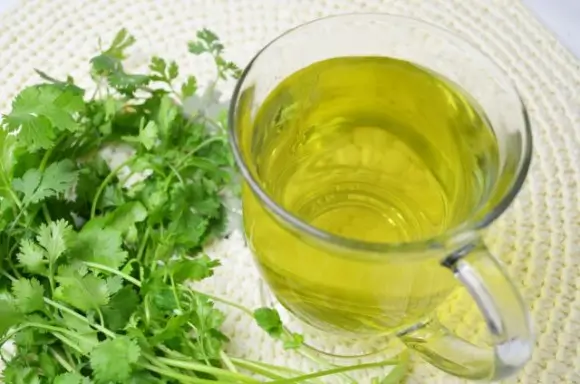
We’ll explore the myriad of health benefits this tea offers, from its impressive vitamin and antioxidant content to its potential detoxifying and blood sugar-regulating properties.
Get ready to elevate your tea routine and discover the hidden wonders of this aromatic herbal infusion.
What is Cilantro Tea, and Why Should You Brew It?
Cilantro tea is an herbal infusion made by steeping fresh or dried cilantro leaves in hot water. This refreshing drink is a delightful way to harness the flavors and potential health benefits of this versatile herb.
Cilantro, also known as coriander leaves, is the leafy green part of the coriander plant, which is widely used in various cuisines around the world.
The aroma and flavor of cilantro tea are often described as fresh, citrusy, and slightly peppery, with a subtle earthy undertone.
While some people may find the taste a bit polarizing, many have grown to love the unique and invigorating flavors of this herbal tea.
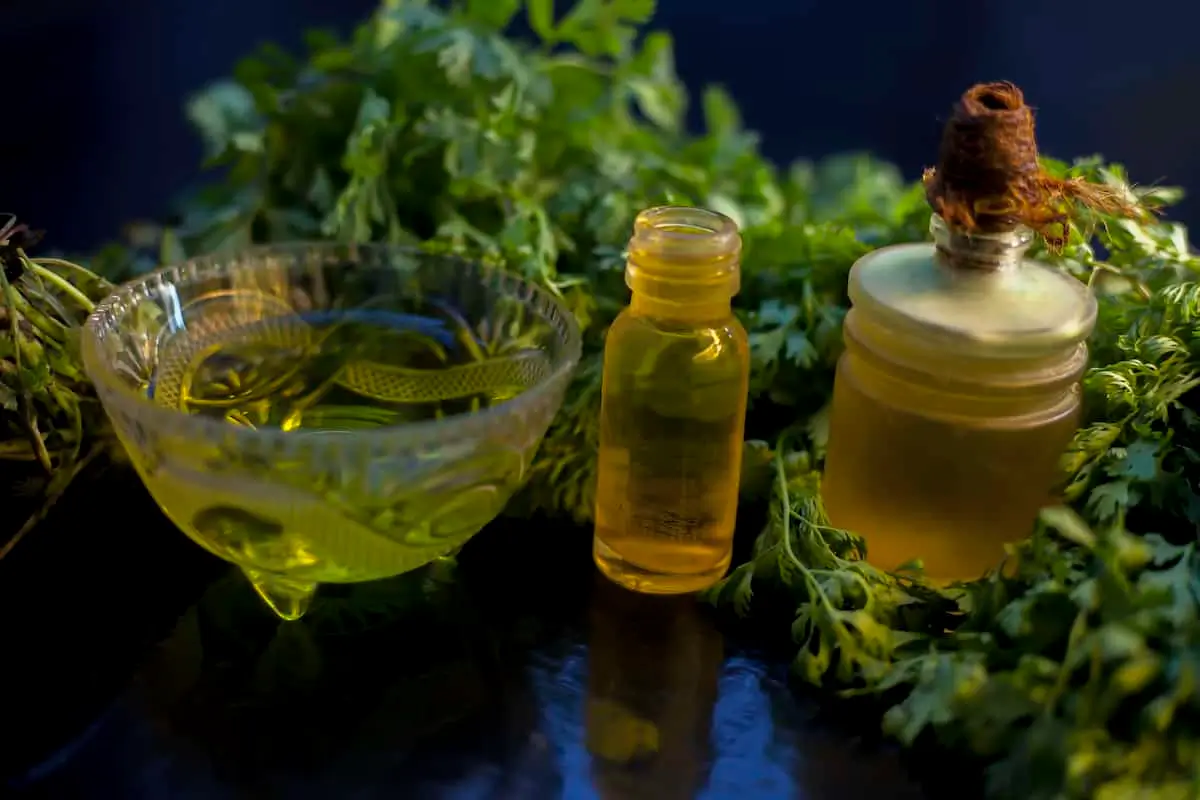
But the appeal of cilantro tea goes far beyond its taste. This beverage is brimming with an array of valuable nutrients and plant compounds that can benefit your overall health.
From its impressive vitamin K content to its potential detoxifying and blood sugar-regulating properties, cilantro tea is a powerful addition to any wellness routine.
How to Make Cilantro Tea: Fresh vs. Dried Leaves
Now that you understand the allure of cilantro tea let’s dive into the step-by-step process of brewing the perfect cup.
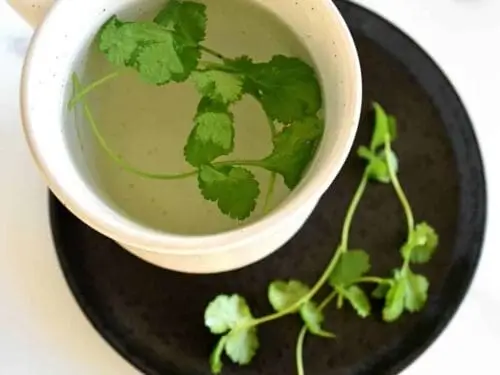
Whether you have access to fresh cilantro leaves or prefer the convenience of dried herbs, I’ve got you covered.
Fresh Cilantro Tea
Ingredients:
- Fresh cilantro leaves
- Boiling water
- Optional: Lemon or lime juice, honey, or sweetener
Instructions:
- Bring water to a boil in an electric kettle or on the stovetop.
- Place a generous handful of fresh cilantro leaves in a tea infuser or directly in a cup.
- Pour the hot water over the cilantro leaves and let them steep for 5 to 7 minutes.
- Remove the infuser or strain the leaves from the tea.
- Optionally, you can add a squeeze of lemon or lime juice and sweeten it with a touch of honey to balance the flavors.
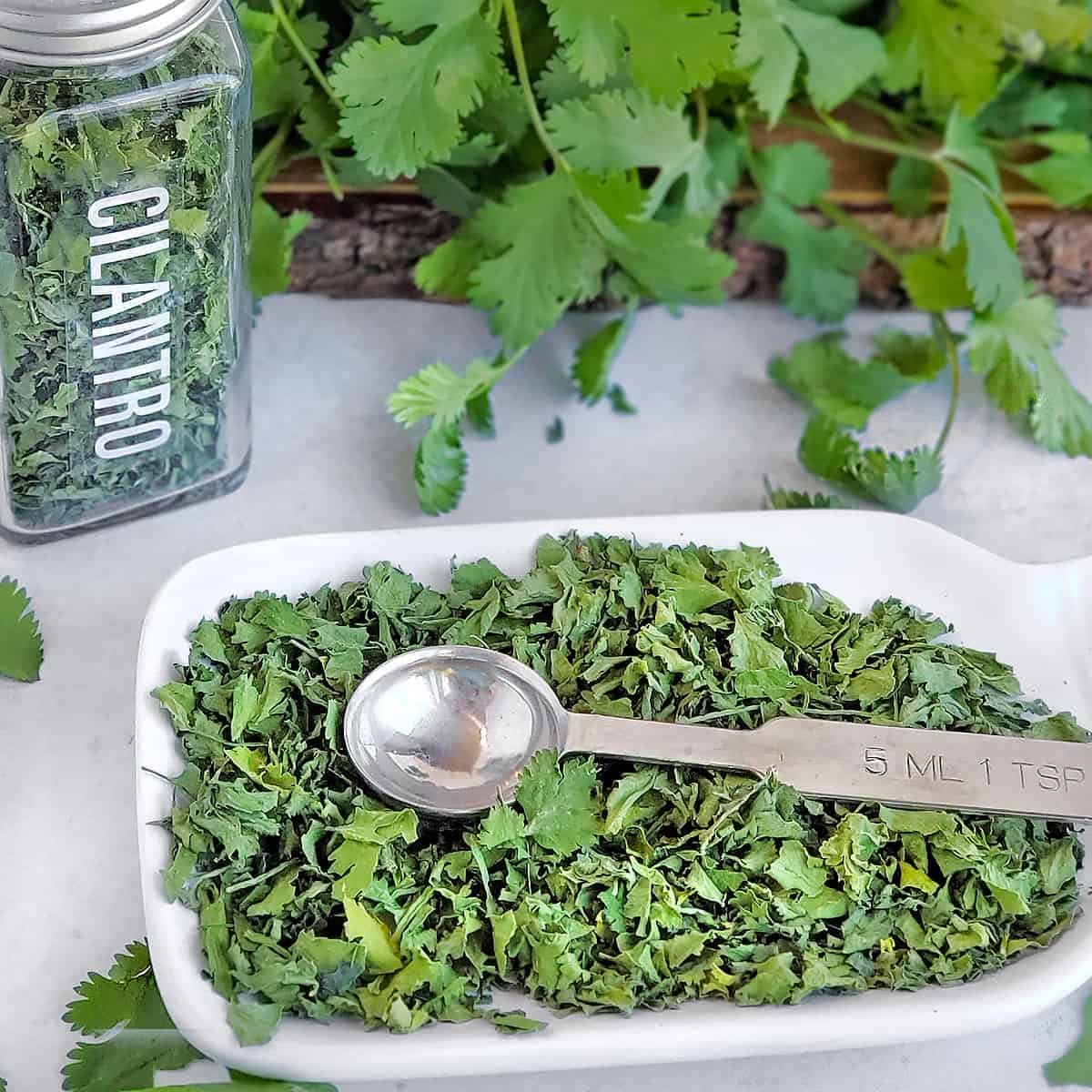
Dried Cilantro Tea
Ingredients:
- Dried cilantro leaves
- Boiling water
- Optional: Lemon or lime juice, honey, or sweetener
Instructions:
- Bring water to a boil.
- Place the dried cilantro leaves in a tea leaf infuser or directly in a cup to prevent the small, dry leaves from ending up in your beverage.
- Pour the hot water over the dried cilantro and let it steep for 5 to 7 minutes.
- Remove the infuser or strain the tea.
- Add a splash of lemon or lime juice and a touch of honey if desired.
Regardless of whether you’re using fresh or dried cilantro, the key is to steep the leaves for 5 to 7 minutes to extract the maximum flavor and health benefits.
Feel free to experiment with different steeping times and proportions of cilantro to water to find your perfect brew.
Health Benefits of Cilantro Tea
Now that you know how to brew a delightful cup of cilantro tea, let’s dive deeper into the impressive health benefits this herbal infusion can offer.
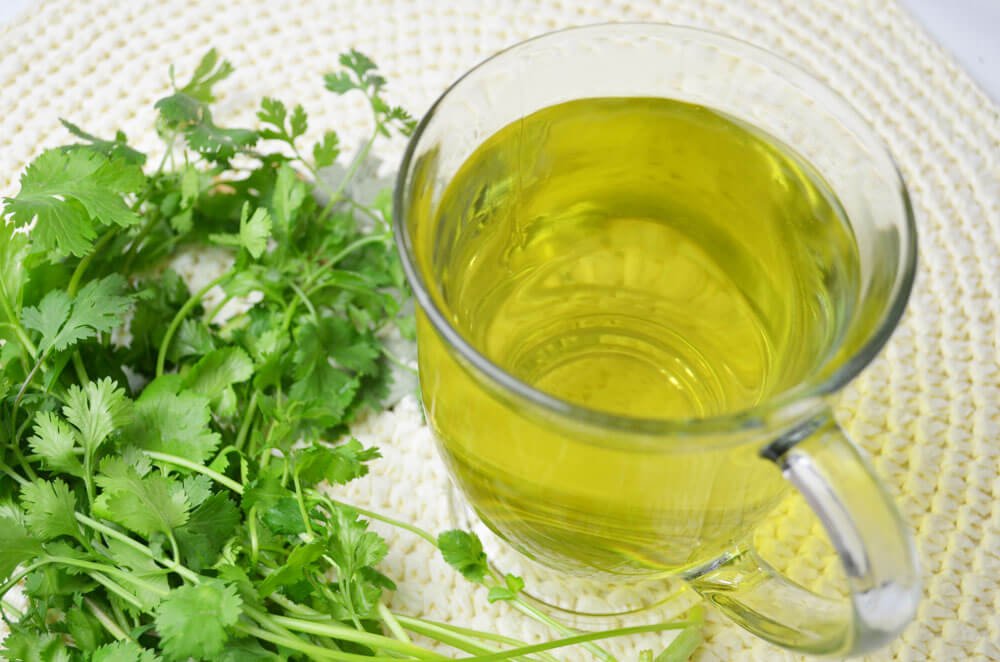
Cilantro is a true powerhouse of nutrients and plant compounds, and when brewed into tea, it can provide a wide range of potential benefits:
Vitamin K Content
Cilantro is an excellent source of vitamin K, with just 2 teaspoons of fresh leaves providing about one-third of an adult’s daily needs. Vitamin K is essential for proper blood clotting and the formation of strong bones.
Detoxification Potential
Studies have suggested that compounds in cilantro leaves may act as natural detoxifying agents. Animal research has shown that cilantro can help bind to and remove toxins like lead from the body, reducing damage to the kidneys and bones.
Diabetes Management
Emerging research indicates that cilantro could potentially benefit individuals with diabetes. Studies on diabetic rats have shown that consuming cilantro can help lower blood glucose levels, reduce cholesterol and triglycerides, and increase antioxidant activity in the liver.
Anti-Inflammatory and Antioxidant Properties
Cilantro is rich in beneficial plant compounds like quercetin, terpinene, and tocopherols, which possess powerful antioxidant and anti-inflammatory properties. These nutrients may help protect the body against oxidative stress and chronic disease.
Improved Heart Health
Some evidence suggests that the compounds in cilantro may help lower blood pressure, improve cholesterol levels, and protect the heart from damage. This could be attributed to the herb’s ability to regulate blood sugar and reduce inflammation.
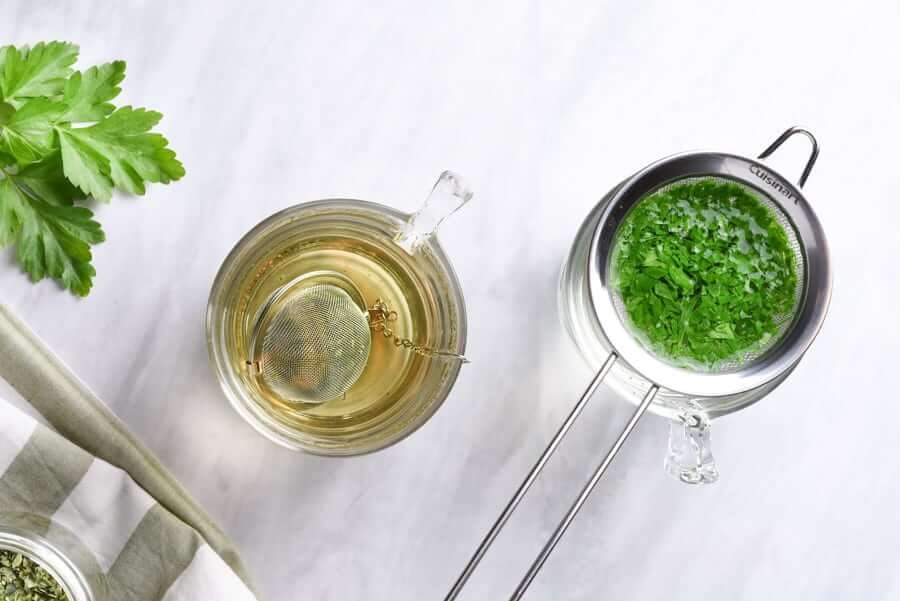
Digestive Support
Cilantro tea may help soothe the digestive tract and alleviate issues like gas, bloating, and stomach discomfort. The herb’s carminative properties can help expel intestinal gas and promote healthy digestion.
It’s important to note that while these potential health benefits of cilantro tea are promising, more research is needed to fully understand its effects on humans.
As with any herbal remedy, it’s always a good idea to consult with a healthcare professional, especially if you have any pre-existing medical conditions or are taking medications.
Exploring Different Cilantro Tea Recipes
One of the best things about cilantro tea is its incredible versatility. Beyond the basic hot brew, you can explore a world of creative and flavorful variations to suit your taste preferences and mood.
Here are a few ideas to get your creative juices flowing:
- Iced Cilantro Tea: Brew a strong batch of cilantro tea, allow it to cool, and then pour it over ice cubes for a refreshing and hydrating iced tea. You can add a splash of lemon or lime juice, a touch of honey, or even a few mint leaves for an extra burst of flavor.
- Cilantro Tea with Ginger: For a warming and immune-boosting twist, try adding freshly grated ginger to your cilantro tea. The spicy and aromatic combination can be especially soothing during the colder months.
- Cilantro Tea Latte: Froth some milk (dairy or non-dairy) and stir it into your freshly brewed cilantro tea for a creamy and cozy latte-style beverage. You can even sprinkle a bit of cinnamon or nutmeg on top for added depth of flavor.
- Cilantro Tea Popsicles: For a fun and kid-friendly summer treat, try freezing your cilantro tea in popsicle molds. You can get creative by adding diced fruit, a touch of honey, or even a splash of fruit juice for a refreshing and healthy frozen treat.
- Cilantro Tea Cocktails: Elevate your happy hour by incorporating cilantro tea into your favorite cocktail recipes. Try mixing it with gin, tequila, or even sparkling wine for a unique and flavorful alcoholic beverage.
The possibilities are endless when it comes to experimenting with cilantro tea. Don’t be afraid to get creative and find new ways to incorporate this versatile herb into your daily routine.
Whether you prefer it hot, iced, or even in a frozen treat, cilantro tea is sure to delight your senses and provide a wealth of potential health benefits.
Concerns and Potential Side Effects of Cilantro Tea
As with any herbal remedy, it’s important to be aware of the potential side effects and concerns associated with consuming cilantro tea. While this beverage is generally considered safe for most people, there are a few important considerations to keep in mind:
- Allergic Reactions: Some individuals may be allergic to cilantro, and consuming the herb could lead to symptoms like hives, facial swelling, throat swelling, severe diarrhea, stomach pain, or darkened skin.
- Upset Stomach: Consuming large amounts of cilantro extract (more than 200 grams per week) may cause gastrointestinal issues like gas, stomach pain, abdominal cramps, and even vomiting or diarrhea in some people.
- Flu-Like Symptoms: There have been rare instances where cilantro has been linked to Cyclospora outbreaks, a parasitic infection that can cause flu-like symptoms like diarrhea, nausea, and fatigue.
- Bleeding Risk: Cilantro can act as a blood thinner and slow down or inhibit blood clotting. Individuals with bleeding disorders or who are taking blood-thinning medications should exercise caution when consuming cilantro tea.
- Taste Perception: For some people who carry the OR6A2 gene, cilantro may taste like soap due to their genetic sensitivity to certain aldehydes present in the herb.
It’s important to listen to your body and discontinue use if you experience any adverse reactions or discomfort after consuming cilantro tea.
As with any herbal remedy, it’s always a good idea to consult with a healthcare professional, especially if you have any pre-existing medical conditions or are taking medications.
Wonders of Cilantro Tea
In conclusion, cilantro tea is a refreshing and versatile herbal infusion that offers a wealth of potential health benefits.
From its impressive vitamin and antioxidant content to its promising effects on blood sugar regulation and detoxification, this beverage is a powerful addition to any wellness routine.
Whether you prefer the fresh and vibrant flavors of the herb or the earthy, aromatic notes of the dried leaves, brewing a delightful cup of cilantro tea is easy.
Experiment with different steeping techniques, flavor combinations, and creative recipes to find your perfect brew.
As with any herbal remedy, it’s important to be mindful of potential side effects and consult with a healthcare professional, especially if you have any pre-existing medical conditions.
But for most people, cilantro tea can be a delightful and healthful way to elevate your tea experience and unlock the hidden wonders of this remarkable herb.